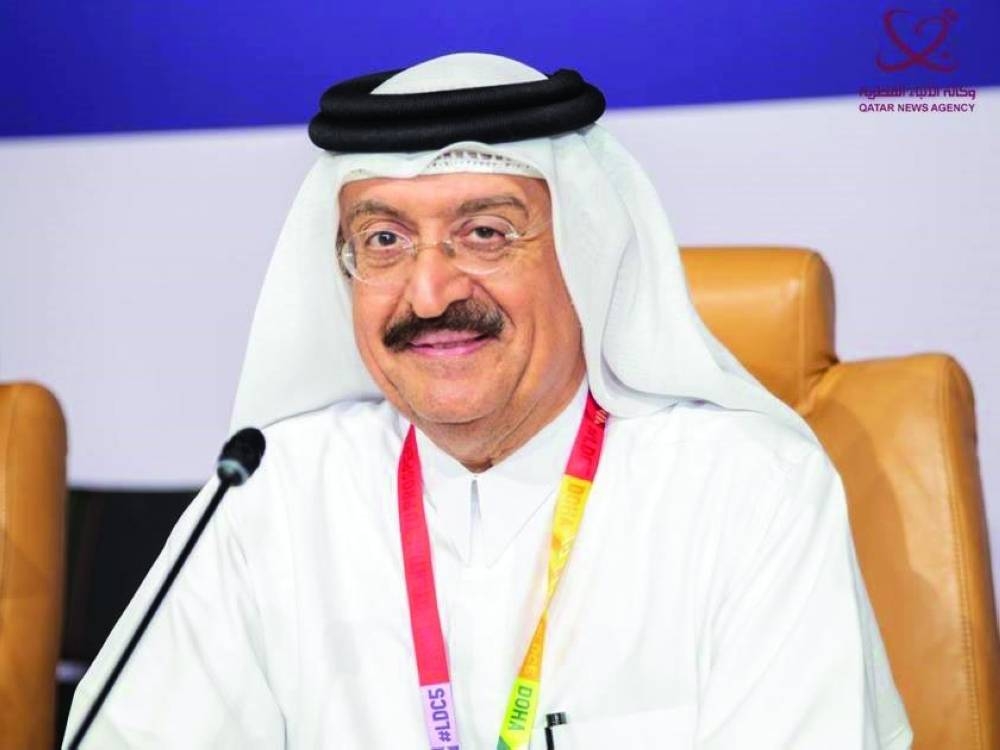During a panel discussion on 'Human rights and achieving the Sustainable Development Goals', on the sidelines of the Fifth United Nations Conference on the Least Developed Countries (LDC5), His Excellency highlighted that the State of Qatar's National Vision 2030 reaffirmed this principle as a pillar of sustainable development nationally, regionally and internationally, pointing out that Qatar spares no effort in spreading the culture of peace, coexistence and acceptance of the other.
UN Officials Praise National Human Rights Committee's Role
International officials, UN officials, human rights activists and ambassadors appreciated what they described as the impressive organization of the National Human Rights Committee's pavilion at the Fifth United Nations Conference on the Least Developed Countries.
They stressed that the National Human Rights Committee plays a very important role, not only at the national level, but also at the regional and international levels.
They praised the committee's publications, which stand for solutions to some problems for all diverse groups, such as people with disabilities, the elderly, vulnerable and marginalized groups, and expatriate workers. The visitors of the exhibition affirmed that Qatar has shown that it is a country of peace and security, thanking Qatar and its national institutions for supporting developing countries and establishing human rights principles.
The exhibition organized by the committee on the sidelines of the conference highlights the role of the committee and the organizers of the international conference on Climate Change and Human Rights, to promote rights-based climate action, and to integrate human rights, including the right to a clean, healthy and sustainable environment.
For his part, the Director of Legal Affairs at the National Human Rights Committee (NHRC) Nasser Marzouq Al Marri, said that development is no longer an issue that economists can reduce to tangible physical criteria such as gross national product, economic growth rates, spending, savings and investment, and other economic criteria, rather, it has become a complex issue with social, cultural, humanitarian and political dimensions.
Al-Marri noted that sustainable human development has emerged in light of the emphasis on the importance of the social and human dimensions of development as the main dominant element, without diminishing the importance of economic growth in improving living conditions.
He explained that sustainable human development and human rights are included within (human centrality), and the relationship between them is an inseparable organic relationship; Because it is not possible to achieve sustainable development without realizing and securing human rights, and vice versa.
Regarding the role of the National Human Rights Committee in achieving the goals of sustainable development, Al-Marri explained that the National Human Rights Committee was established pursuant to Decree Law No. 38 of 2002 amended by Law No. 17 of 2010, as an independent national body that works to follow up on ensuring human rights in all their forms, whether they are civil, political, or economic, social and cultural rights in the State of Qatar, in accordance with the Paris Principles of 1993, which govern the work of national human rights institutions.
He pointed out that the committee occupies a vital and active space in the public sphere. Being the constructive and supportive link for human rights between civil society organizations and groups of society,
He stressed that the Qatar National Vision 2030 is the general framework through which strategies and implementation plans that link the present with the future can be prepared, because it depicts a vibrant and prosperous society in which social and economic justice prevails.
Human Rights Officer at the UN Human Rights Training and Documentation Centre for South-West Asia and the Arab Region Ishraq bin Al Zain said that the Office of the UN High Commissioner for Human Rights made a significant contribution to the integration of human rights in the process of preparing the 2030 plan and setting the 17 Sustainable Development Goals (SDGs).
The SDGs with their 169 targets and 23 unique indicators seek to define the direction of global and national development policies, to provide new options and opportunities to bridge the gap between human rights and development, and to ensure that strategies and policies adopted to implement the 2030 Agenda remain inclusive and rooted in human rights, she said.
She added that the 2030 Agenda is fully rooted in human rights, and is clearly rooted in the Universal Declaration of Human Rights, international treaties in the field of human rights and other relevant instruments, such as the Declaration of the Right to Development, pointing out that the SDGs seek to the realization of human rights for all as stated in the 2030 Agenda.
The 2030 Agenda is universally applicable to all people in all developed and developing countries, Al Zain added, stressing that it is committed to achieving a wide range of social, economic and environmental goals, by building more peaceful, just and inclusive societies, devoid of fear and violence, and particularly concerned with democratic governance, the rule of law, access to justice, and personal security.
She added that the 2030 Agenda seeks to include everyone without any exception, and is keen to build a world in which respect for equality prevails, non-discrimination between and within countries, including gender equality, and reaffirming the responsibilities of all states to respect human rights, protect and promote it, without discrimination of any kind.
In the same context, Technical Representative and Head of UNDP Office in Doha Biplove Choudhary praised the State of Qatar's efforts in organizing the LDC5, stressing that development is an acquired right for all.
He stressed on the need to involve people in sustainable development, which is the main driver for achieving justice, pointing out that the UNDP helps governments to achieve sustainable development and present initiatives and recommendations.
He pointed out that the issue of climate change had a major and significant negative impact on human rights, represented by life, health, food and clean air, warning of the seriousness of these problems, which are the most serious and prominent threat to humans.

